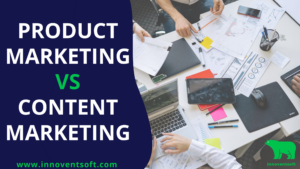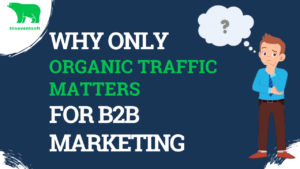Ineffectiveness of Ads paves the path for Organic marketing
With few regulations wrt to data-privacy implemented by technology giants, there has been a significant impact on Digital advertisements. Let us have a look at some of these regulations:
Google plans to phase out 3rd party cookies by 2023
An update has been implemented by Google that prevents third-party tracking cookies. This will be bad news for many digital advertisers. However, this might be good for users who don’t want advertisers to track them and their activities all over the internet.
Apple restricts data with iOS 14 update, killing IDFA
Just like Google’s advertising identifier, GAID, Apple’s Identifier for Advertisers helps mobile marketers attribute ad spend. All of the attribution and profiling facility in Apple will go away with iOS 14 update. If an app wants to use the IDFA, iOS 14 will present mobile users with permission message – “Do you want ABC app to allow tracking?”. In my opinion, 99% of consumers would not allow, thereby killing IDFA. Consequently the profiling could not be done, and hence Ads are going to be ineffective.
Meta faces regulatory headwinds and Ad-tech privacy reckoning
Meta’s advertisement business is certainly heavily exposed to any regulatory hurricane of enforcement against permission-less internet tracking. As of today, Meta doesn’t offer its own users any opt out from behavioral targeting. With a growing body of legislation aimed at protecting consumer data privacy on the internet, headlined by the European Union’s General Data Protection Regulation (GDPR), it is evident that the road ahead for Meta will be full of regulatory headwinds.
Modern problems wrt to lead generation, require Organic Marketing- a solution to the cookieless world.
Organic Marketing, the powerful B2B channel to get leads from content
Organic Marketing in brief
Organic marketing refers to the act of attracting customers to your product or service naturally over a period of time. Organic marketing is achieved by creating relevant content such as blog posts, case studies, guest posts, unpaid tweets, social media posts or Facebook updates that gets you found on search engines and ultimately drives traffic to your website.
Read more on What is Organic Marketing and Why you need it in 2022?
For example, whenever we search for anything on Google, the SERP (Search Engine Results Page) will usually display either the paid results (suggested ads) that use cookies or results based on relevance and utility which are achieved using good SEO.
SEO, the last mile to make good content perform
When we write a content that is SEO optimized, ranks in top pages in a SERP and is easy to find out by someone, it means that page has authentic and relevant content that Google algorithm believes will be useful to the person doing the searching and hence the reason, it is considered ‘Organic’. Instead of using cookies and paid advertising to reach potential customers, organic marketing helps users find the best content available in a natural and organic way. We do not push advertisements for products or platforms that advertise merit without taking into account the needs of the users or what they are actually looking for. It’s about making thoughtful, useful content that is ranked because it answers questions your audience asks. By focusing on providing relevant information, organic marketing has the ability to engage with people in meaningful ways that paid advertising cannot.
With Google’s recent announcement to stop selling cookie-based advertising, paid advertising will soon lose much of the impact and reach it targets. Organic marketing, on the other hand, will keep people connected to the content they are looking for. Think of it this way. When you stop investing in paid advertising, the momentum stops. Ads will no longer appear and you will not be able to generate new leads or clients. Conversely, organic content continues to drive traffic long after content has been created and invested. This is because search engines will continue to rank content that people find useful. It is a tried-and-true method based on the basic idea of a broad network of strategic quality versus paid quantity.
Generating leads through optimized content
As long as the content you create remains relevant, good SEO and organic marketing can help you continue to attract new customers and stay competitive in your industry. Let’s understand why:
Attract quality audience
In traditional advertising campaigns, you pay to be seen by your customers. But with organic SEO, you can reach people by giving them the content they really need. Instead of having people click through your ads, you can spend your time creating really good content that’s fun, informative, and educational. In this way, trust is built between the brand and its customers. Remember that your website visitors are not a demographic, and good SEO allows people who aren’t directly targeted by your ads to discover you. If you rank higher for your keywords and appear in the SERP, you will get more visitors and more qualified leads to your site. Also, if people like your content and find it useful, they tend to share it, which further expands your user base.
Generate leads and nurture them
If you rely on paid advertising, your business or brand may seem too sales-centric. People can understand when you’re trying to sell them something and that’s exhausting them. The value of paid advertising is often based on sales that consumers believe will benefit the business. Organic marketing, on the other hand, creates value by giving users what they need.
Improve marketing ROI
Paid ads allow you to pay right away. As long as you’re ready to invest in your campaign, your ads will continue to show. However, it is expensive and the users are rarely skilled. It’s much less cost-effective as you pay per click. Also, you have no control over your ad spend, and there is always a chance that your ad will never appear at all. Not only does organic marketing require less financial investment, but it also offers far greater long-term benefits and a much higher ROI.
Since the content is based on connecting people with quality and relevant information, SEO will continue to work as long as the information remains useful and will help in generating traffic even during unpredictable disruptions like Google’s phasing out of third-party cookies occur.
Grow website organically is the need of hour
The digital advertising landscape is changing rapidly as paid advertising becomes more volatile and unreliable. Tighter privacy laws give users more control over the data they share, which means that targeted ads are less specific and more random.
When paid advertising can’t be consistent in a changing landscape of solution providers and privacy laws, organic marketing offers a powerful approach that will continue to work. Organic SEO marketing is not affected by changes in privacy laws, as it is based on useful and effective content that does not rely on cookies. Users get more of what they want and your brand is more visible in the demographics they care about. That is, everyone wins. As the cookie expiration date approaches, Google’s algorithm updates continue to rank the most relevant content. Prioritizing organic marketing can help mitigate the negative impact of reduced paid advertising ROI and keep your brand ahead.
Using our Intelligent Content Marketing (ICM) platform, we are helping American unicorns and emerging Indian startups increase their website visibility and generate leads with better customer experience. If you want to start Organic Marketing, please contact us here.





